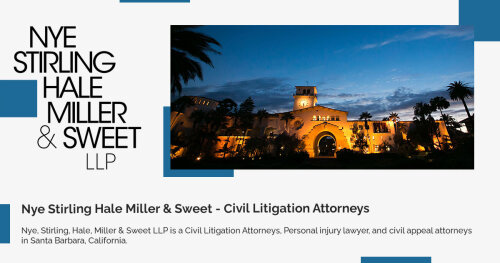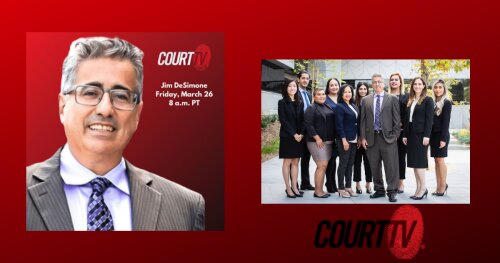Best Hiring & Firing Lawyers in California
Share your needs with us, get contacted by law firms.
Free. Takes 2 min.
Or refine your search by selecting a city:
List of the best lawyers in California, United States
About Hiring & Firing Law in California, United States
Hiring and firing employees in California is a legally complex process that requires both employers and employees to understand their rights and responsibilities. California is known for offering some of the most employee-friendly protections in the United States, which affects how hiring decisions are made and under what circumstances a termination can legally take place. Compliance with these laws is crucial to avoid legal disputes and costly consequences.
Why You May Need a Lawyer
Legal assistance can be valuable in several scenarios related to hiring and firing. For employers, navigating regulations regarding discrimination, wrongful termination, and wage-and-hour laws can be challenging. Employees may need legal help if they believe they were not hired or were terminated for unlawful reasons such as discrimination, retaliation, or whistleblowing. A lawyer can provide critical guidance during investigations, negotiations for severance, or when filing claims with state agencies.
Local Laws Overview
California law governs many aspects of the employment relationship. Key features include:
- At-Will Employment - Most employment is at-will, meaning either party can end the employment relationship at any time, with or without cause. However, there are significant exceptions for discrimination, retaliation, or other unlawful reasons.
- Discrimination Protections - The Fair Employment and Housing Act (FEHA) prohibits discrimination based on race, religion, gender, sexual orientation, disability, age, and other protected categories during both hiring and termination.
- Background Checks - Strict regulations apply to the use of background checks, including disclosures and consent requirements under California law and the federal Fair Credit Reporting Act (FCRA).
- Wage and Hour Laws - Employers must comply with state and local minimum wage laws, overtime pay requirements, and proper classification of employees and independent contractors, including under the AB 5 legislation.
- Wrongful Termination - Employees cannot be fired for reasons that violate public policy, including retaliation for reporting workplace violations, or for taking protected leave, such as under the California Family Rights Act (CFRA).
- Severance and Final Pay - California law mandates prompt payment of wages at termination and outlines rules about severance agreements and the release of legal claims.
Frequently Asked Questions
What does at-will employment mean in California?
At-will employment gives both employers and employees the right to end employment at any time, for any reason, or no reason at all, except for reasons that violate the law, such as discrimination or retaliation.
Can I be fired without warning in California?
Yes, unless you have an employment contract or are covered by a union agreement that requires notice or a disciplinary process, at-will employees may be terminated without warning. However, the reason for termination must be legal.
What protected categories are recognized under California hiring and firing laws?
Protected categories include race, color, religion, sex, gender identity, gender expression, sexual orientation, national origin, ancestry, marital status, disability, age (40 and over), genetic information, and military or veteran status, among others.
Is it legal for an employer to ask about criminal history before hiring?
Generally, California’s "Ban the Box" law prohibits employers from asking about criminal history before making a conditional job offer. There are exceptions for certain positions or employers, such as those requiring background checks by law.
What is considered wrongful termination?
Wrongful termination occurs when an employee is fired for an illegal reason, such as discrimination, retaliation for whistleblowing, or for taking protected leave. Breach of an employment contract can also result in wrongful termination.
How soon must an employer pay my final wages after I am fired?
If you are terminated, all owed wages must be paid immediately at the time of termination. For employees who resign and give at least 72 hours notice, final wages are due on the last workday; otherwise, within 72 hours.
Are severance packages required by law in California?
Severance pay is not required by law in most cases unless it is part of an employment agreement or company policy. However, employers often offer severance in exchange for a release of legal claims.
What recourse do I have if I believe I was not hired or was fired due to discrimination?
You may file a complaint with the California Civil Rights Department (CRD) or the federal Equal Employment Opportunity Commission (EEOC). Legal consultation is advised to evaluate your situation and next steps.
Can my employer fire me for reporting illegal activity?
No, California laws protect employees from retaliation for reporting illegal acts, unsafe working conditions, or other violations in the workplace.
How do independent contractor laws affect hiring and termination?
California’s AB 5 law presumes that workers are employees unless employers can prove otherwise using the "ABC test." Misclassification can lead to legal penalties, so employers should assess roles carefully before hiring or terminating independent contractors.
Additional Resources
- California Department of Industrial Relations (DIR) - Oversees wage and hour issues, workplace safety, and labor standards.
- California Civil Rights Department (CRD) - Accepts complaints regarding workplace discrimination, harassment, and retaliation.
- Equal Employment Opportunity Commission (EEOC) - Handles federal workplace discrimination complaints.
- Local Bar Associations - Often provide lawyer referral services and legal clinics.
- Legal Aid Organizations - Offer assistance to low-income individuals with workplace issues.
Next Steps
If you are facing a hiring or firing situation and need legal advice, start by gathering all relevant documents, such as employment contracts, offer letters, termination notices, and any correspondence related to your concerns. Consider making detailed notes about the events and dates involved. You may wish to contact a California employment lawyer to discuss your rights and options. Reaching out to state agencies such as DIR or CRD is another way to seek guidance or initiate a formal complaint. Acting quickly can be important, as there are time limits for filing certain claims. Always consult with a qualified legal professional to protect your rights and interests.
Lawzana helps you find the best lawyers and law firms in California through a curated and pre-screened list of qualified legal professionals. Our platform offers rankings and detailed profiles of attorneys and law firms, allowing you to compare based on practice areas, including Hiring & Firing, experience, and client feedback.
Each profile includes a description of the firm's areas of practice, client reviews, team members and partners, year of establishment, spoken languages, office locations, contact information, social media presence, and any published articles or resources. Most firms on our platform speak English and are experienced in both local and international legal matters.
Get a quote from top-rated law firms in California, United States — quickly, securely, and without unnecessary hassle.
Disclaimer:
The information provided on this page is for general informational purposes only and does not constitute legal advice. While we strive to ensure the accuracy and relevance of the content, legal information may change over time, and interpretations of the law can vary. You should always consult with a qualified legal professional for advice specific to your situation.
We disclaim all liability for actions taken or not taken based on the content of this page. If you believe any information is incorrect or outdated, please contact us, and we will review and update it where appropriate.
Browse hiring & firing law firms by city in California
Refine your search by selecting a city.















